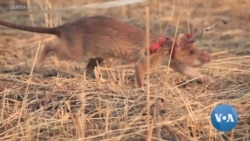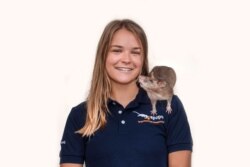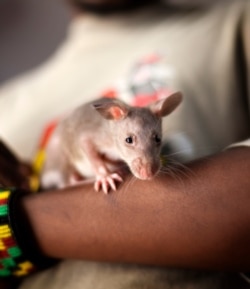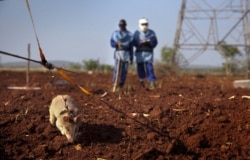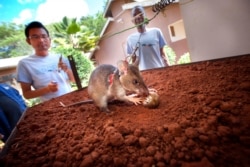Student Union
- By Julie Taboh
How To Unearth Land Mines? Hero Rats
CHARLESTON, SOUTH CAROLINA — Most people think of rats as dirty, disease-ridden creatures that should be avoided at all cost.
But not the folks at APOPO, a global nonprofit organization in Tanzania that has developed an innovative method of detecting landmines and tuberculosis by using African giant pouched rats' extraordinary sense of smell.
Saving lives
Ellie Cutright, who has loved rats all her life, works on the APOPO research team.
"There's a very negative connotation about rats, which is kind of sad," she said during a recent visit to her hometown of Charleston, South Carolina. "I was a child who had rats as a pet, so I got over that negative connotation."
Cutright had followed APOPO on Facebook for years when she noticed a job announcement during her last year of college and applied. "I never really thought I would get the job, but here we are," she beamed.
"I think rats are very intelligent, and they can be amazing animals," she said. "And the kind we work with are all very sweet, they like to be held and be handled, they like to interact with people, and they really like to work hard. They are really out to please you."
Amazing rats
The giant rats, which grow to about the size of a domestic cat, are born and bred at the organization's headquarters in Morogoro, Tanzania.
Once they open their eyes — at around four or five weeks old — they are socialized to handle people and adjust to the environment around them. Training starts when they're weaned from their mother — at around 10 weeks old — with a click and reward system, "which means food, so they're very happy about that since they really like to eat," Cutright explained.
The landmine rats first train on a small table covered with soil where they are taught to sniff for tea eggs — much like the kind used to infuse tea — filled with TNT.
"When they approach that, they get the click and the food reward, so then they learn that the smell of this TNT means food," Cutright said. "And then slowly we stretch out the area that they're working in so they're running on a leash and they try to find the tea egg with the TNT inside."
Hero rats
Once the rats start working in the minefield and they find a landmine, they scratch on the ground to alert their handler, who then places a small marker at that spot. "He can then go over and safely remove the mine and get rid of it," Cutright said.
The rats work in minefields in Tanzania and are also sent to other countries around the world, where an estimated 110 million hidden landmines and other dangerous remnants of war are at risk of exploding.
Traditionally, landmine detection is done by humans and machines, but rats are more effective and cost-efficient, Cutright said.
"They're really fast at finding mines," she added. "And they can cover a lot of ground very quickly."
Using a metal detector will pick up an assortment of random metal objects that are laying around, she said.
"Might be a soda cap or something that a metal detector will find, but the rats aren't going to pay any attention to that. They're only searching for the smell of the explosives," she added.
The rats are also easy to house and feed.
"They only eat fruits and vegetables that are grown locally, and the training takes about a year, so there's not such a long time that we have to house them, to pay for them and pay for the training," Cutright said.
While the rodents are too lightweight to set off a mine, they are still risking their lives. So these giant, pouched rats are nicknamed "HeroRATS."
To date, these diligent heroes have detected more than 107,000 landmines and unexploded ordnances, freeing almost a million people from the threat of explosives. "And opening up the land for the people who are living in that area to farm, or to build their house," Cutright said.
College of Charleston
Cutright started working at APOPO after graduating with a degree in psychology from the College of Charleston, in South Carolina.
Cutright said her school prepared her well for her job in research.
"I took a psychology course my first semester there, and I just really fell in love with it," she said. "I was really excited by all the possibilities and by what I could do with that sort of degree."
She credits her psychology professor, Chad Galuska, for nurturing her interest in the field.
"I worked in a lab with him for two years and we worked with rats. So that's kind of where I got my start in the rat research world," she said.
Cutright caught up with Galuska on the college campus during a recent visit, and excitedly talked about her work in Africa.
Galuska said, "The preparation that she received here in the areas of classical conditioning and operant conditioning and training animals to do things, she was able to take out of the classroom, out of the lab and apply them in a way to actually save people's lives."
But he also acknowledged that her success has something to do with her own smarts.
"Her critical thinking skills are some of the best I've seen here at the college," he said. "And also, she is fiercely independent. From the time she started working in my lab, she wanted to do everything on her own. And that was somewhat new to me, because I was used to mentoring students in a different way."
STEM studies
College of Charleston school president Andrew Hsu is proud of Cutright and what she has accomplished, both in school and in her job, and said she is a good example of the kind of success stories his students and graduates have experienced.
"We prepare them not only with the sciences they need in order to succeed, but we give them a well-rounded liberal arts education so that they have the ability of critical thinking, creativity, collaboration and communication," he said. "All of those [skills] are needed to be successful as a global citizen."
One of the key missions at the school, he said, is to encourage more women to enter STEM-related fields, and he is working hard to achieve that goal.
"We're living in a global economy, whether you like it or not, and it's becoming a global village," he said. "Global fluency is extremely important for the future generation."
"So we're trying very hard to make sure that our students have not only the language fluency, but also the cultural fluency as well as the global experience throughout their four years of education," Hsu added.
Cutright said she never thought that her dynamic academic training, together with her own natural drive, would take her all the way to Africa, but she's happy it did.
She's using those abilities every day, doing research and helping to educate people about the Hero Rats she's come to adore.
"I think the work that APOPO does is really important in kind of spreading the word that rats are not just a pest," she said. "They really are heroes. And they show us every day that they are worthy of that name."
See all News Updates of the Day
- By VOA News
Competition grows for international students eyeing Yale

It’s tough to gain admission to Yale University, and it’s getting even tougher for international students as standout students from around the world set their sights on Yale.
The Yale Dale News, the campus newspaper, takes a look at the situation here.
- By VOA News
Student from Ethiopia says Whitman College culture made it easy to settle in

Ruth Chane, a computer science major from Ethiopia, writes about her experiences settling into student life at Whitman College in the U.S. state of Washington.
"The community at Whitman College made sure I felt welcomed even before I stepped foot on campus," she says.
- By VOA News
Claremont Colleges student gets a shock when she heads home to Shanghai

In The Student Life, the student newspaper for the Claremont Colleges, a consortium of five liberal art colleges and two graduate schools in Claremont, California, student Rochelle Lu writes about readjusting to her Shanghai home after spending a semester in the United States.
- By VOA News
Cedarville University aims to ease transition for international students

Cedarville University in the U.S. state of Ohio says it’s got more than 140 international students representing 44 countries.
Here, the school interviews Jonathan Sutton, director of international student services. He talks about his job and the opportunities for international students on campus.
- By VOA News
Morehouse College offers prospective students tips on applying and thriving

Morehouse College, a private, historically Black liberal arts college in the U.S. state of Georgia, offers a guide for international students interested in attending the school.
Among the tips to apply and thrive at Morehouse:
- Take advantage of the school’s orientation program
- Turn to the school’s Center for Academic Success for tutoring, support and more
- Immerse yourself in campus life via clubs and societies
- By Reuters
US reviews Columbia University contracts, grants over antisemitism allegations

The administration of President Donald Trump said on Monday it will review Columbia University's federal contracts and grants over allegations of antisemitism, which it says the educational institution has shown inaction in tackling.
Rights advocates note rising antisemitism, Islamophobia and anti-Arab bias since U.S. ally Israel's devastating military assault on Gaza began after Palestinian Hamas militants' deadly October 2023 attack.
The Justice Department said a month ago it formed a task force to fight antisemitism. The U.S. Departments of Health and Education and the General Services Administration jointly made the review announcement on Monday.
"The Federal Government's Task Force to Combat Anti-Semitism is considering Stop Work Orders for $51.4 million in contracts between Columbia University and the Federal Government," the joint statement said.
The agencies said no contracting actions had been taken yet.
"The task force will also conduct a comprehensive review of the more than $5 billion in federal grant commitments to Columbia University."
The agencies did not respond to requests for comment on whether there were similar reviews over allegations of Islamophobia and anti-Arab bias.
Columbia had no immediate comment. It previously said it made efforts to tackle antisemitism.
College protests
Trump has signed an executive order to combat antisemitism and pledged to deport non-citizen college students and others who took part in pro-Palestinian protests.
Columbia was at the center of college protests in which demonstrators demanded an end to U.S. support for Israel due to the humanitarian crisis caused by Israel's assault on Gaza. There were allegations of antisemitism and Islamophobia in protests and counter-protests.
During last summer's demonstrations around the country, classes were canceled, some university administrators resigned and student protesters were suspended and arrested.
While the intensity of protests has decreased in recent months, there were some demonstrations last week in New York after the expulsion of two students at Columbia University-affiliated Barnard College and after New York Governor Kathy Hochul ordered the removal of a Palestinian studies job listing at Hunter College.
A third student at Barnard College has since been expelled, this one related to the occupation of the Hamilton Hall building at Columbia last year.
Canada’s immigration overhaul signals global shift in student migration
From Europe to North America, nations are tightening their immigration policies. Now Canada, long seen as one of the world's most welcoming nations, has introduced sweeping changes affecting international students. The reforms highlight a growing global trend toward more restrictive immigration policies. Arzouma Kompaore reports from Calgary.
Trump administration opens antisemitism inquiries at 5 colleges, including Columbia and Berkeley

The Trump administration is opening new investigations into allegations of antisemitism at five U.S. universities including Columbia and the University of California, Berkeley, the Education Department announced Monday.
It's part of President Donald Trump's promise to take a tougher stance against campus antisemitism and deal out harsher penalties than the Biden administration, which settled a flurry of cases with universities in its final weeks. It comes the same day the Justice Department announced a new task force to root out antisemitism on college campuses.
In an order signed last week, Trump called for aggressive action to fight anti-Jewish bias on campuses, including the deportation of foreign students who have participated in pro-Palestinian protests.
Along with Columbia and Berkeley, the department is now investigating the University of Minnesota, Northwestern University and Portland State University. The cases were opened using the department's power to launch its own civil rights reviews, unlike the majority of investigations, which stem from complaints.
Messages seeking comment were left with all five universities.
A statement from the Education Department criticized colleges for tolerating antisemitism after Hamas' Oct. 7, 2023, attack on Israel and a wave of pro-Palestinian protests that followed. It also criticized the Biden administration for negotiating "toothless" resolutions that failed to hold schools accountable.
"Today, the Department is putting universities, colleges, and K-12 schools on notice: this administration will not tolerate continued institutional indifference to the wellbeing of Jewish students on American campuses," said Craig Trainor, the agency's acting assistant secretary for civil rights.
The department didn't provide details about the inquiries or how it decided which schools are being targeted. Presidents of Columbia and Northwestern were among those called to testify on Capitol Hill last year as Republicans sought accountability for allegations of antisemitism. The hearings contributed to the resignation of multiple university presidents, including Columbia's Minouche Shafik.
An October report from House Republicans accused Columbia of failing to punish pro-Palestinian students who took over a campus building, and it called Northwestern's negotiations with student protesters a "stunning capitulation."
House Republicans applauded the new investigations. Representative Tim Walberg, chair of the Education and Workforce Committee, said he was "glad that we finally have an administration who is taking action to protect Jewish students."
Trump's order also calls for a full review of antisemitism complaints filed with the Education Department since Oct. 7, 2023, including pending and resolved cases from the Biden administration. It encourages the Justice Department to take action to enforce civil rights laws.
Last week's order drew backlash from civil rights groups who said it violated First Amendment rights that protect political speech.
The new task force announced Monday includes the Justice and Education departments along with Health and Human Services.
"The Department takes seriously our responsibility to eradicate this hatred wherever it is found," said Leo Terrell, assistant attorney general for civil rights. "The Task Force to Combat Anti-Semitism is the first step in giving life to President Trump's renewed commitment to ending anti-Semitism in our schools."
- By VOA News
STEM, business top subjects for international students

The Times of India breaks down the most popular subjects for international students to study in the U.S.
STEM and business lead the pack. Read the full story here. (January 2025)
- By VOA News
Safety and visa difficulties among misconceptions about US colleges

U.S. News & World report addresses some of the misconceptions about U.S. colleges and universities, including the difficulty of getting a visa.
Read the full story here. (January 2025)
- By VOA News
Work opportunities help draw international students to US schools

US News & World Report details the three top factors in foreign students' decision to study in the U.S. They include research opportunities and the reputation of U.S. degrees. Read the full story here. (December 2024)
- By VOA News
British student talks about her culture shock in Ohio

A British student who did a year abroad at Bowling Green State University in Ohio talks about adjusting to life in America in a TikTok video, Newsweek magazine reports.
Among the biggest surprises? Portion sizes, jaywalking laws and dorm room beds.
Read the full story here. (December 2024)
- By VOA News
Harvard's Chan School tells international students what to expect

Harvard's T.H. Chan School of Public Health reaches out to international students by detailing the international student experience at the school.
Learn more about housing, life in Boston and more here.
- By Reuters
China unveils plan to build 'strong education nation' by 2035

China issued its first national action plan to build a "strong education nation" by 2035, which it said would help coordinate its education development, improve efficiencies in innovation and build a "strong country."
The plan, issued Sunday by the Communist Party's central committee and the State Council, aims to establish a "high quality education system" with accessibility and quality "among the best in the world."
The announcement was made after data on Friday showed China's population fell for a third consecutive year in 2024, with the number of deaths outpacing a slight increase in births, and experts cautioning that the downturn will worsen in the coming years.
High childcare and education costs have been a key factor for many young Chinese opting out of having children, at a time when many face uncertainty over their job prospects amid sluggish economic growth.
"By 2035, an education power will be built," the official Xinhua news agency said, adding that China would explore gradually expanding the scope of free education, increase "high-quality" undergraduate enrolment, expand postgraduate education, and raise the proportion of doctoral students.
The plan aims to promote "healthy growth and all-round development of students," making sure primary and secondary school students have at least two hours of physical activity daily, to effectively control the myopia, or nearsightedness, and obesity rates.
"Popularizing" mental health education and establishing a national student mental health monitoring and early warning system would also be implemented, it said.
It also aims to narrow the gap between urban and rural areas to improve the operating conditions of small-scale rural schools and improve the care system for children with disabilities and those belonging to agricultural migrant populations.
The plan also aims to steadily increase the supply of kindergarten places and the accessibility of preschool education.
- By VOA News
A look at financial aid options for international graduate students in US

The Open Notebook, a site focusing on educating journalists who cover science, has complied a list of U.S. graduate program financial aid information for international students.




